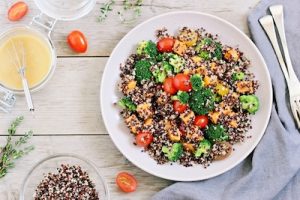As we age, our hormone levels can fluctuate, which can cause changes in how we feel. Learning about the foods that can help balance hormone levels can help you feel better overall.
What we eat can affect our hormone levels and our overall health. Getting older means that some hormones will increase and others decrease, while yet others will stay the same. We can see and feel these hormonal changes in the form of irritability, muscle loss, lower libido, lower bone density, brain fog, and mood changes. Thankfully, there are foods that will help balance your hormone levels and relieve these symptoms.
Vitamin B Foods
Cortisol is mainly known as the fight-or-flight hormone, as it regulates our response to stress and fear. Other functions of cortisol include regulating blood pressure, inflammation, blood sugar glucose and our body’s use of carbs, protein and fats.
One reason cortisol levels can become unbalanced is constant stress. Constant stress causes an overload of cortisol, which can lead to inflammation, high blood pressure and other illnesses.
Eating foods that are high in B vitamins helps lower stress levels in our body, which will lower levels of cortisol. Some good food sources of B vitamins include the following:
- Oatmeal and other whole grain foods
- Beans and lentils
- Dark leafy greens like collard greens, Swiss chard and broccoli
- Fruit like oranges, avocados and bananas
- Eggs
- Yogurt
Since there are eight different B vitamins, it is important to eat a well-rounded diet in order to get the required amount of all B vitamins. If you eat a vegan or plant-based diet, you should take a vitamin B12 supplement.
Eat Enough Protein
As we get older, we might not have the big appetite we once did. If you eat fewer calories, there is a chance you’re not getting enough protein. We don’t need that much protein per day, only about 50 to 70 grams, but skipping meals could mean you’re not getting the amount of protein necessary to balance hormone levels. The best sources of protein include the following:
- Quinoa
- Beans and lentils
- Almonds and peanuts
- Rolled oats
- Greek yogurt
Healthy Fats to Balance Hormone Levels
Even though there is fat in all foods, there are some healthy fats you should include in your diet. Healthy fats are necessary for the absorption of the fat-soluble vitamins A, D, E and K. If these vitamins are not absorbed, you could develop a vitamin deficiency, causing a hormonal imbalance. Fat is also needed for the formation and proper functioning of hormones. Include healthy fats such as the following in your diet:
- Fish like wild-caught salmon or sardines
- Olives
- Avocados
- Nuts and seeds
- Ground flax seeds or chia seeds
Prebiotic and Probiotic Foods
Having healthy gut bacteria is needed for overall good health and balanced hormones. To have healthy gut bacteria, you have to eat probiotic and prebiotic foods. Prebiotic foods would be high-fiber plant food like vegetables, whole grains, beans, lentils and fruits. Prebiotic foods help good gut bacteria continue to multiply and grow. Probiotic foods create good gut bacteria. Probiotic foods are fermented foods:
- Yogurt, dairy or non-dairy
- Sauerkraut
- Miso
- Kefir
- Sourdough bread
Fiber
Too much estrogen creates a hormonal imbalance. Fiber not only helps create good gut bacteria, but it also flushes out extra estrogen, restoring hormonal balance. If a man’s estrogen levels are too high, this can cause depression and weight gain.
For women, too much estrogen can cause numerous symptoms, including mood swings, anxiety attacks, weight gain, hair loss, fatigue, memory loss and cold hands or feet. This can be alleviated with eating enough fiber.
Iodine and Selenium
The thyroid plays an important role in regulating weight, metabolism and mood. When it doesn’t get enough of the right nutrients, it can cause a hormonal imbalance. Iodine is important for the thyroid. You can use iodized salt or seaweed like kelp or dulse and sprinkle it on soups and food.
Selenium is just as important for the thyroid. Eating just one or two Brazil nuts each day will give you all the selenium you need. You don’t want to eat more, however, because too much selenium isn’t healthy.






